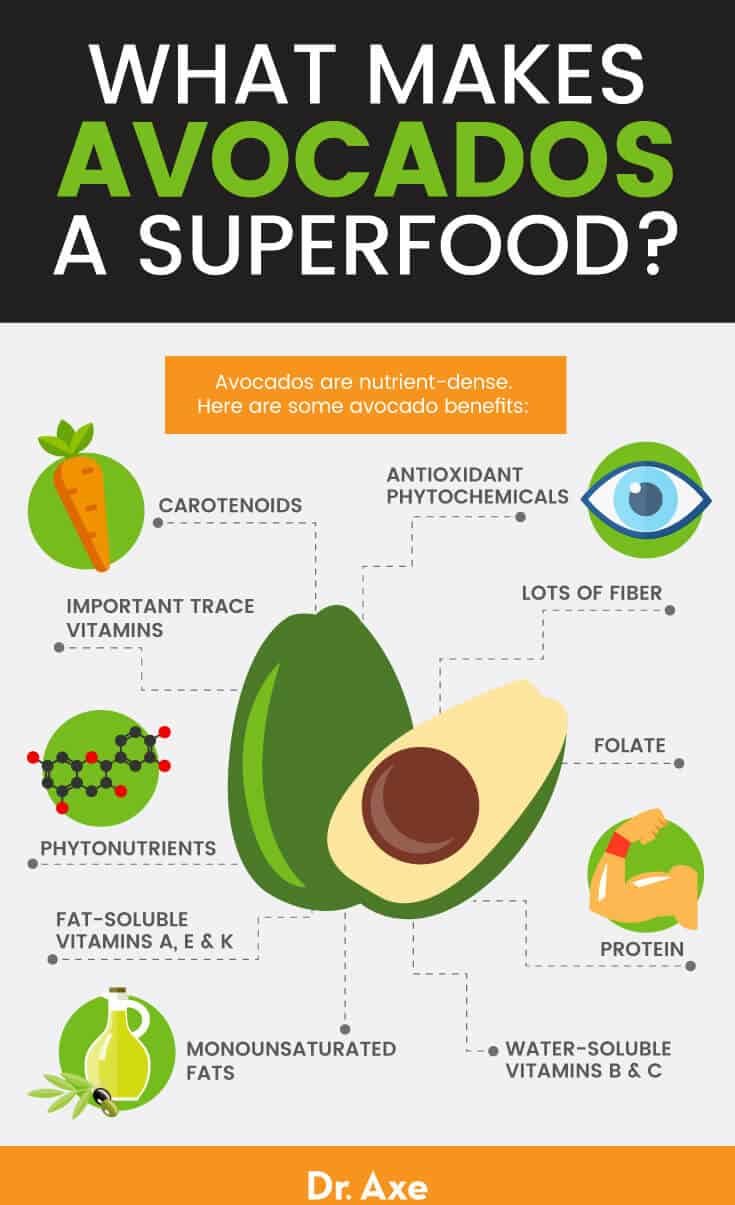Why Everyone is Calling Avocado a Superfood (And Why You Should Eat More)
From brunch staple to health guru’s darling, the humble avocado has transcended its origins to become a global culinary icon. It graces everything from gourmet toasts and vibrant salads to creamy smoothies and even decadent desserts. More than just a versatile ingredient, the avocado has firmly cemented its status as a "superfood," a term often thrown around with a mix of enthusiasm and skepticism. But in the case of this emerald-green fruit, the hype is not just justified; it’s deeply rooted in a rich tapestry of historical appreciation, cutting-edge nutritional science, and undeniable health benefits.
For the discerning and knowledgeable audience, it’s not enough to simply declare something a superfood. We seek understanding, the ‘why’ behind the ‘what.’ This article delves deep into the fascinating world of the avocado, unpacking the scientific truths that underpin its legendary status, exploring its journey from ancient Mesoamerican staple to modern health marvel, and ultimately, making an irrefutable case for why this incredible fruit deserves a more prominent place on your plate.
The Avocado’s Ancient Lineage: A Story of Sustenance and Reverence
The story of the avocado begins not in a trendy café, but thousands of years ago in the heart of Mesoamerica. Archaeological evidence suggests that avocados (Persea americana) were cultivated as far back as 5,000 to 7,000 B.C. by indigenous populations in what is now south-central Mexico. The Aztecs revered the fruit, calling it "ahuacatl," which translates to "testicle tree," likely due to its shape and the way it hangs in pairs. Beyond its suggestive appearance, the avocado was a vital source of sustenance, valued for its rich, creamy flesh and dense nutritional profile, particularly in regions where other fat sources were scarce.
It wasn’t just a food item; it was interwoven with cultural and spiritual significance. The Mayans also held it in high regard, and its cultivation spread across Central and South America long before European arrival. When Spanish conquistadors encountered the fruit in the 16th century, they were intrigued. Gonzalo Fernández de Oviedo y Valdés, a Spanish chronicler, documented the fruit in 1526, describing its "good taste and a very delicate savor." The Spanish introduced the avocado to other parts of the world, though its journey to global culinary prominence was a slow burn, punctuated by periods of misunderstanding and mislabeling.
For centuries, the avocado was often dismissed or viewed with suspicion in Western cultures, primarily due to its high-fat content. In an era obsessed with low-fat diets, the avocado was seen as a dietary villain, a calorific indulgence to be avoided. This narrative, however, began to shift dramatically in the late 20th and early 21st centuries, as scientific understanding of dietary fats evolved. The revelation that not all fats are created equal, and indeed, some are profoundly beneficial, paved the way for the avocado’s triumphant return to the health spotlight. This historical context is crucial because it highlights a fundamental truth: the avocado was a superfood long before the term was coined, its inherent nutritional value recognized and relied upon by ancient civilizations. Modern science has merely caught up to ancient wisdom.
Unpacking the Nutritional Powerhouse: The Science Behind the Superfood Label
The avocado’s claim to superfood status isn’t based on anecdotal evidence or fleeting trends; it’s meticulously supported by its unparalleled nutritional composition. Each creamy bite is a dense package of vitamins, minerals, healthy fats, and potent plant compounds that work synergistically to promote optimal health.
The MVP: Monounsaturated Fats (MUFAs)
Let’s confront the elephant in the room: fat. A medium avocado contains approximately 20-25 grams of fat, a figure that historically made many recoil. However, the vast majority of this fat – around 75% – is monounsaturated fatty acids (MUFAs), primarily oleic acid. This is the same healthy fat found in olive oil, celebrated for its profound health benefits.
Why MUFAs are so crucial:
- Heart Health: Oleic acid is a formidable ally in the fight against cardiovascular disease. Numerous studies have shown that regular consumption of MUFAs can help lower levels of low-density lipoprotein (LDL) cholesterol, often dubbed "bad" cholesterol, while simultaneously increasing high-density lipoprotein (HDL) cholesterol, the "good" kind that helps remove cholesterol from arteries. This balanced lipid profile significantly reduces the risk of atherosclerosis, heart attacks, and strokes. Furthermore, MUFAs have anti-inflammatory properties that protect blood vessels and improve endothelial function.
- Insulin Sensitivity and Blood Sugar Control: MUFAs play a role in improving insulin sensitivity, which is vital for regulating blood sugar levels. This makes avocados an excellent food choice for individuals managing type 2 diabetes or those at risk. Their fat content also slows down the digestion of carbohydrates, preventing rapid spikes in blood glucose.
- Satiety and Weight Management: Despite their caloric density, the healthy fats in avocados contribute significantly to satiety. Fat takes longer to digest than carbohydrates or protein, helping you feel fuller for longer periods, thereby reducing overall calorie intake and supporting weight management efforts.
Fiber: The Gut’s Best Friend
Beyond its rich lipid profile, the avocado is an exceptional source of dietary fiber. A single medium avocado can provide around 10-13 grams of fiber, representing a significant portion of the recommended daily intake (25-38 grams). This fiber content is a blend of both soluble and insoluble types, each contributing unique benefits.
- Digestive Health: Insoluble fiber adds bulk to stool, facilitating regular bowel movements and preventing constipation. Soluble fiber, on the other hand, forms a gel-like substance in the digestive tract, which helps regulate blood sugar levels, lower cholesterol, and feed beneficial gut bacteria.
- Gut Microbiome Support: The soluble fiber in avocados acts as a prebiotic, nourishing the trillions of bacteria that reside in your gut. A healthy and diverse gut microbiome is increasingly recognized as central to overall health, influencing everything from immunity and mood to nutrient absorption and disease prevention.
- Blood Sugar Regulation: Fiber slows down the absorption of sugars into the bloodstream, preventing sharp peaks and valleys in blood glucose levels, which is beneficial for sustained energy and metabolic health.
A Cornucopia of Vitamins and Minerals
The avocado’s nutrient density extends far beyond fats and fiber. It boasts an impressive array of essential vitamins and minerals, many of which are present in surprisingly high concentrations.
- Potassium (More than Bananas!): Often overlooked in the shadow of its flashier counterparts, potassium plays a pivotal role in maintaining healthy blood pressure, counteracting the effects of sodium. A single avocado contains more potassium than a medium-sized banana, making it an excellent dietary tool for cardiovascular health and fluid balance.
- Vitamin K: Essential for blood clotting and bone health, Vitamin K is abundantly present in avocados. Adequate intake of Vitamin K is linked to a lower risk of osteoporosis and improved bone mineral density.
- Vitamin C: A powerful antioxidant, Vitamin C supports immune function, collagen production (vital for skin, hair, and nails), and helps protect cells from oxidative damage.
- Vitamin E: Another potent fat-soluble antioxidant, Vitamin E protects cell membranes from damage, supports immune function, and contributes to healthy skin and eyes. Its synergy with the healthy fats in avocado makes it particularly bioavailable.
- B Vitamins (B5, B6, Folate): Avocados are a good source of several B vitamins.
- Folate (Vitamin B9): Crucial for cell growth and division, particularly important during pregnancy for preventing neural tube defects. It also plays a role in mood regulation and cognitive function.
- Pantothenic Acid (Vitamin B5): Essential for energy production and metabolism.
- Pyridoxine (Vitamin B6): Involved in numerous metabolic processes, including protein metabolism, red blood cell formation, and neurotransmitter synthesis.
Phytonutrients and Antioxidants: The Invisible Guardians
Beyond the standard vitamins and minerals, avocados are packed with a diverse range of phytonutrients – plant compounds that offer powerful antioxidant and anti-inflammatory benefits.
- Carotenoids (Lutein and Zeaxanthin): These are particularly notable for their role in eye health. Lutein and zeaxanthin accumulate in the macula of the eye, where they act as natural sunscreens, filtering harmful blue light and protecting against age-related macular degeneration (AMD) and cataracts. The healthy fats in avocado enhance the absorption of these fat-soluble carotenoids.
- Phenolic Compounds: Avocados contain various phenolic compounds, including catechins and epicatechins, which are potent antioxidants with anti-inflammatory properties, further contributing to cellular protection and disease prevention.
- Glutathione: Often called the "master antioxidant," glutathione is crucial for detoxification processes in the liver and plays a key role in protecting cells from oxidative stress. Avocados are one of the few fruits that contain significant amounts of this vital compound.
The synergy of these nutrients – the healthy fats enhancing the absorption of fat-soluble vitamins and carotenoids, the fiber supporting gut health, and the antioxidants battling oxidative stress – creates a truly remarkable food matrix. It’s this comprehensive, interconnected nutritional profile that elevates the avocado beyond a mere fruit and firmly places it in the superfood pantheon.
Beyond the Nutrients: Targeted Health Benefits of Regular Avocado Consumption
Understanding the individual components is one thing; appreciating their collective impact on human health is another. Regular consumption of avocados has been linked to a myriad of specific health benefits, making a compelling case for why everyone should incorporate more of this fruit into their diet.
1. Cardiovascular Health: A Heart’s Best Friend
As highlighted earlier, the avocado’s robust profile of monounsaturated fats, fiber, and potassium makes it an exceptional food for heart health. Studies have consistently shown that incorporating avocados into a balanced diet can lead to significant improvements in cholesterol levels, reduced blood pressure, and decreased markers of inflammation, all crucial factors in preventing heart disease, the leading cause of mortality worldwide. The beta-sitosterol, a plant sterol found in avocados, also contributes to lowering cholesterol absorption.
2. Brain Function and Cognitive Health: Fueling Your Mind
The brain, being largely composed of fat, thrives on healthy fats. The MUFAs in avocados are vital for maintaining the structural integrity of brain cell membranes and supporting efficient nerve transmission. Furthermore, the folate in avocados plays a crucial role in cognitive function, memory, and mood regulation by assisting in the production of neurotransmitters. The antioxidants (Vitamins C, E, and various phytonutrients) protect brain cells from oxidative damage, which is implicated in neurodegenerative diseases like Alzheimer’s and Parkinson’s. Regular avocado consumption can thus contribute to sharper cognitive function and potentially reduce the risk of age-related cognitive decline.
3. Gut Health and Digestion: A Happy Tummy, A Happy You
The high fiber content of avocados is a boon for the digestive system. Both soluble and insoluble fibers work in concert to ensure regularity, prevent constipation, and maintain a healthy gut microbiome. A balanced microbiome, in turn, influences everything from nutrient absorption and immune function to mood and metabolism. By acting as a prebiotic, avocados help foster the growth of beneficial gut bacteria, contributing to overall gut integrity and reducing the risk of digestive disorders.
4. Weight Management and Satiety: Smart Snacking
Despite being calorically dense, avocados are excellent for weight management due to their ability to promote satiety. The combination of healthy fats and fiber slows digestion, leading to prolonged feelings of fullness and reducing the likelihood of overeating or unhealthy snacking between meals. Studies have shown that individuals who consume avocados tend to have lower body mass indexes (BMIs) and smaller waist circumferences. When integrated into a mindful eating pattern, avocados can be a powerful tool for maintaining a healthy weight.
5. Skin and Hair Radiance: Beauty from Within
The adage "you are what you eat" holds particularly true for skin and hair health, and avocados are a prime example. The healthy fats contribute to skin elasticity and hydration, while Vitamins C and E act as powerful antioxidants, protecting skin cells from damage caused by UV radiation and environmental pollutants. Vitamin C is also essential for collagen synthesis, the protein that provides structure and firmness to the skin. The comprehensive nutrient profile supports cellular repair and regeneration, contributing to a healthy, glowing complexion and lustrous hair.
6. Eye Health: Protecting Your Vision
The presence of lutein and zeaxanthin in avocados is a significant benefit for ocular health. These potent carotenoids are the only dietary carotenoids that accumulate in the retina, specifically the macula, where they filter harmful blue light and neutralize free radicals. Regular intake of these compounds is associated with a reduced risk of age-related macular degeneration (AMD) and cataracts, two leading causes of vision impairment and blindness in older adults.
7. Blood Sugar Regulation and Diabetes Management: A Glycemic Ally
With a low glycemic index and a rich fiber and healthy fat profile, avocados have a minimal impact on blood sugar levels. They help slow the absorption of carbohydrates, preventing sudden spikes in glucose after meals. This makes them an ideal food for individuals with diabetes or pre-diabetes, aiding in better blood sugar control and reducing the risk of insulin resistance.
8. Anti-Inflammatory Properties: Battling Chronic Disease
Chronic inflammation is a silent perpetrator behind many modern diseases, including heart disease, cancer, and autoimmune conditions. The myriad of antioxidants, healthy fats, and phytonutrients in avocados collectively exert powerful anti-inflammatory effects throughout the body. By neutralizing free radicals and modulating inflammatory pathways, avocados contribute to a systemic reduction in inflammation, promoting overall health and resilience against disease.
9. Nutrient Absorption Enhancer: The "Bioavailability Booster"
Perhaps one of the avocado’s most underrated superpowers is its ability to enhance the absorption of other fat-soluble nutrients from other foods. Carotenoids (like beta-carotene in carrots, lycopene in tomatoes) and fat-soluble vitamins (A, D, E, K) require dietary fat for optimal absorption. When you add avocado to a salad, for instance, you’re not just adding its own nutrients; you’re significantly increasing the bioavailability of the healthy compounds from all the other vegetables in that salad. This makes avocados an excellent companion food, amplifying the nutritional punch of your entire meal.
Addressing the Avocado’s "Controversies": Fat Content and Sustainability
While the benefits are clear, it’s worth briefly touching on common concerns.
"Too much fat/calories?" This myth largely stems from outdated dietary advice. As we’ve established, the fat is predominantly healthy monounsaturated fat. While avocados are calorie-dense, their high fiber and fat content mean a moderate portion (e.g., half an avocado) is incredibly satiating and nutrient-rich. It’s about nutrient density per calorie, not just raw calorie count. When used as a replacement for less healthy fats or incorporated into balanced meals, avocados are a net positive.
Sustainability: The growing demand for avocados has raised questions about their environmental impact, particularly concerning water usage and land conversion. It’s a valid concern for any globally traded crop. While avocados do require water, often less than some other crops grown in similar regions, responsible sourcing and sustainable farming practices are critical. As knowledgeable consumers, seeking out ethically sourced avocados and supporting companies committed to sustainability can help mitigate these impacts. This complexity, however, does not diminish the fruit’s profound nutritional value.
Embracing the Avocado: Practical Integration into Your Diet
Given its impressive nutritional profile and myriad health benefits, the question isn’t if you should eat more avocado, but how. The true beauty of the avocado lies in its astonishing versatility, making it incredibly easy to incorporate into virtually any meal or snack.
Tips for selection and storage:
- Ripeness: A ripe avocado will yield gently to pressure when squeezed. If it’s rock hard, it needs a few days on the counter. If it’s mushy, it’s likely overripe.
- Storage: Store unripe avocados at room temperature. Once ripe, refrigerate to slow down further ripening. To prevent browning after cutting, sprinkle with lemon or lime juice, cover tightly with plastic wrap, and refrigerate.
Creative ways to enjoy more avocado:
- The Classic Avocado Toast: A perennial favorite for a reason. Mash avocado with a pinch of salt and pepper, spread on whole-grain toast. Elevate it with chili flakes, everything bagel seasoning, a poached egg, cherry tomatoes, or feta cheese.
- Guacamole: The ultimate dip. Fresh avocados, red onion, cilantro, lime juice, jalapeño, and salt. Serve with crudités, whole-grain chips, or as a topping for tacos and burritos.
- Salad Enhancer: Cubed or sliced avocado adds a creamy texture and nutrient boost to any salad. It also helps you absorb the fat-soluble vitamins from other vegetables.
- Smoothie Power-Up: Add half an avocado to your morning smoothie for an incredibly creamy texture, healthy fats, and fiber without overpowering the flavor. It makes a smoothie more satisfying and less prone to sugar crashes.
- Egg Companion: Dice avocado into scrambled eggs, omelets, or serve slices alongside fried eggs.
- Healthy Mayonnaise Substitute: Mash avocado and use it as a healthier alternative to mayonnaise in sandwiches, wraps, or chicken/tuna salad.
- Creamy Sauces and Dressings: Blend avocado into salad dressings for a creamy texture or create a rich, dairy-free sauce for pasta or grilled proteins.
- Dessert Surprise: Yes, really! Avocado can replace butter or heavy cream in some dessert recipes, adding a silky texture and healthy fats to chocolate mousse, puddings, or even ice cream, without imparting a strong avocado flavor.
- Soup Thickener: Blend a quarter or half an avocado into vegetable soups for extra creaminess and nutritional density.
- Avocado Fries: For a unique side dish, cut avocado into wedges, coat in a seasoned breading (almond flour or panko), and bake or air fry until crispy.
The sheer adaptability of the avocado means there’s no excuse not to enjoy its benefits. From breakfast to dinner, sweet to savory, it seamlessly integrates into a diverse range of culinary traditions and personal preferences.
Conclusion: The Uncontested Reign of the Superfood Avocado
The journey of the avocado, from its ancient origins as a revered staple to its current status as a global superfood, is a testament to its enduring power. It is a story where scientific discovery has validated ancestral wisdom, where meticulous research has demystified old fears, and where culinary creativity has unlocked endless possibilities.
The avocado isn’t just a trendy ingredient; it’s a nutritional powerhouse, a vibrant green testament to the profound impact whole foods can have on our health. Its unique blend of healthy monounsaturated fats, dietary fiber, an impressive array of vitamins and minerals, and potent phytonutrients creates a synergistic effect that profoundly benefits the heart, brain, gut, eyes, skin, and overall metabolic well-being. It promotes satiety, aids in weight management, helps regulate blood sugar, and acts as a powerful anti-inflammatory agent.
For the knowledgeable consumer, the evidence is compelling and conclusive. The call to embrace the avocado is not mere culinary enthusiasm; it is an invitation to invest in your health, to savor a food that is as delicious as it is nutritious, and to partake in a legacy of wellness that spans millennia. So, next time you reach for that perfectly ripe avocado, remember you’re not just enjoying a tasty fruit – you’re tapping into a rich source of vitality, a true superfood that genuinely lives up to its name. Make it a regular part of your diet, and allow its creamy goodness to nourish you from the inside out.







